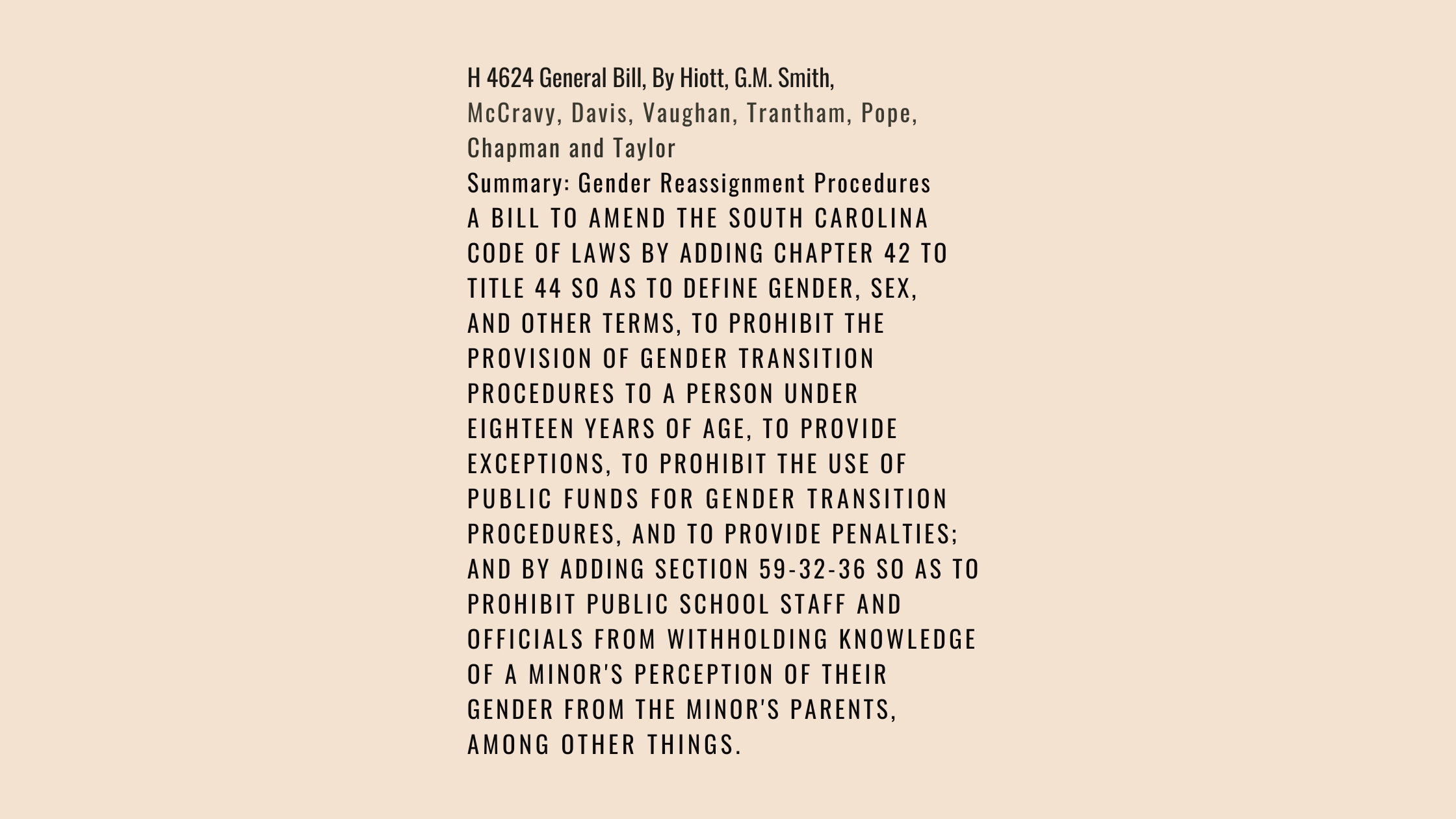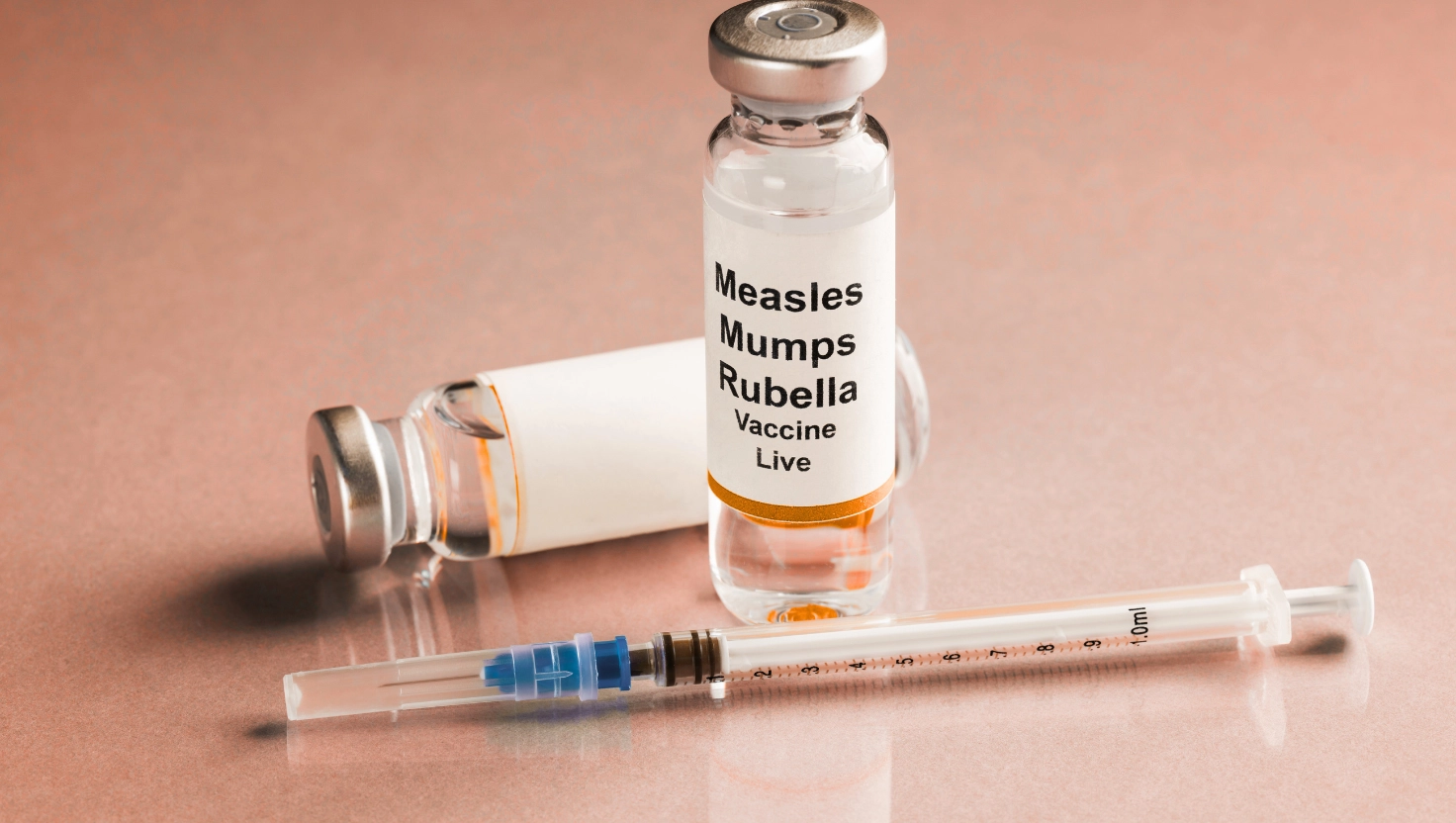H4624
H. 4624 : This bill proposes amendments to the South Carolina Code of Laws, adding provisions to Title 44 and Title 59. It defines key terms related to gender and sex, and prohibits healthcare professionals from providing gender transition procedures to individuals under 18, with certain exceptions for specific medical conditions. The bill also bars the use of public funds for such procedures and outlines penalties for violations. Additionally, it mandates that public school staff cannot conceal a minor’s perception of their gender from the parents and must inform them if a student is believed to suffer from gender dysphoria or related conditions. This bill aims to regulate gender transition procedures for minors and ensure parental involvement in matters of their children's gender identity.
Concerns
Section 44-42-310: (3) "Gender" means the psychological, behavioral, social, and cultural aspects of being male or female.
Legitimizing this definition is dangerous.
Here is a perfect example of accepting a new (culturally evolved change specifically initiated in the 1970s for the exact purpose of promoting “gender confusion” as it is being used today.)
Opens the door for future "refinements" in the definitions through simple amendments. "Marriage" is a great example of this action.
Section 44-42-320: (A) A physician, mental health provider, or other health care professional shall not knowingly provide gender transition procedures to a person under eighteen years of age.
Good luck proving that someone acted "knowingly".
Determining what someone knew or intended at a particular time is inherently subjective. It relies on interpreting actions, statements, and circumstantial evidence, which may not always clearly indicate a person's internal state of mind.
Direct evidence of a person's knowledge or intent is rare.
The legal system's standards for proving intent or knowledge are stringent, especially in criminal cases where the standard is "beyond a reasonable doubt." Meeting this high threshold requires compelling, clear, and convincing evidence.
Section 44-42-320: C) If prior to August 1, 2024, a health care professional initiated a course of treatment that includes the prescription, delivery, or administration of a puberty-blocking drug or a cross-sex hormone to a person under the age of eighteen, and if the health care professional determines and documents in the person's medical record that immediately terminating the person's use of the drug or hormone would cause harm to the person, the health care professional may institute a period during which the person's use of the drug or hormone is systematically reduced. That period may not extend beyond January 31, 2025.
This completely negates everything in this bill by allowing a gaping hole in any resistance when someone can just allege harm can be done.
Section 44-42-320: (4) any procedure undertaken because the person suffers from a physical disorder, physical injury, or physical illness that would, as certified by a physician, place the person in imminent danger of death or impairment of a major bodily function unless treated by the physician.
Section 44-42-320(4) of the bill creates an easy-to-exploit loophole.
The language about what constitutes a "physical disorder, injury, or illness" leading to "imminent danger" will be interpreted broadly. A physician can determine that the mental health implications of denying gender transition procedures, such as severe depression or suicidal ideation, fall under this category, thus permitting the procedure.
This clause relies heavily on a physician's judgment. Different physicians will have varying thresholds for what they consider to be "imminent danger of death or impairment." This subjectivity leads to inconsistent application of the law.
Section 59-32-36
School counselors often have ethical obligations to maintain confidentiality with their students.
Other Concerns
ADDING CHAPTER (MORE LAW! NOT GOOD!)
In South Carolina, as per S.C. Code Ann. § 63-5-340, minors aged 16 or older can consent to health services without the need for additional consent. The proposed bill prohibits gender transition procedures for individuals under 18, which is in conflict with the existing law that allows minors 16 or older to consent to health services.
The contradiction between the existing law and the bill will result in judicial scrutiny to determine which law should prevail.
Conclusion: It is baffling that legislators are essentially endorsing the nonsensical concept of "gender ideology" by incorporating it into legal statutes. In doing so, they are not merely acknowledging but also legitimizing it, despite the bill's feeble attempt at addressing it. This action by lawmakers represents the direct insertion of a completely, confusing, false and dangerous idea into the fabric of legal governance, carrying far-reaching consequences.
Disclaimer: This analysis is provided from a conservative constitutional perspective and has not been influenced by lawyers, special interest groups, or lobbyists. Our aim is to offer an objective and grounded understanding of the proposed bill's potential impact and legal implications. We strongly encourage you, as a constituent who may be directly affected by the unintended consequences of this legislation, to thoroughly review the bill. We advise formulating your own concerns based on your reading and understanding of the bill. Your voice is important in this legislative process. We urge you to communicate any concerns or questions you have to your local legislator.
Update 3/1/24
H4624 has successfully advanced from the House and is quickly moving through the Senate. Soon it will hit the Senate Floor for further consideration.
What action can you take? Reach out to your Senator to express your opposition to this bill. Your voice matters in shaping the outcome.
Committee report: Favorable with amendment Medical Affairs
Note: This bill has been amended several times.
Update 2/14/24
H4624: A subcommittee of the Medical Affairs Committee will meet on Wednesday, February 14 at 10:00
The Medical Affairs Committee will meet on Thursday, February 15 at 10:00 in Room 308, pending approval of the following bill in subcommittee the previous day.
Senate Medical Affairs subcommittee - Wednesday, February 21st
Update 1/10/24
Several amendments were made to this bill, including the deletion of Section 44-42-310: (B). Subsection (B) was decisively more forceful and explicit compared to point (2). It mandates school officials to proactively notify parents about a student's gender dysphoria, a direct obligation. In contrast, point (2) simply prohibits withholding such information, a passive approach that will lead to ambiguity and inaction. The problem with (2) is its potential for non-communication despite awareness of the student's situation.

Subscribe to ConservaTruth's Email Newsletter for curated insights on South Carolina's legislative activities and conservative viewpoints, delivered straight to your inbox! With vetted and easy-to-understand information, our newsletter empowers you to become an informed and engaged citizen, actively participating in safeguarding our cherished Constitutional values. Don’t miss out on crucial updates—join our community of informed conservatives today!





Comments